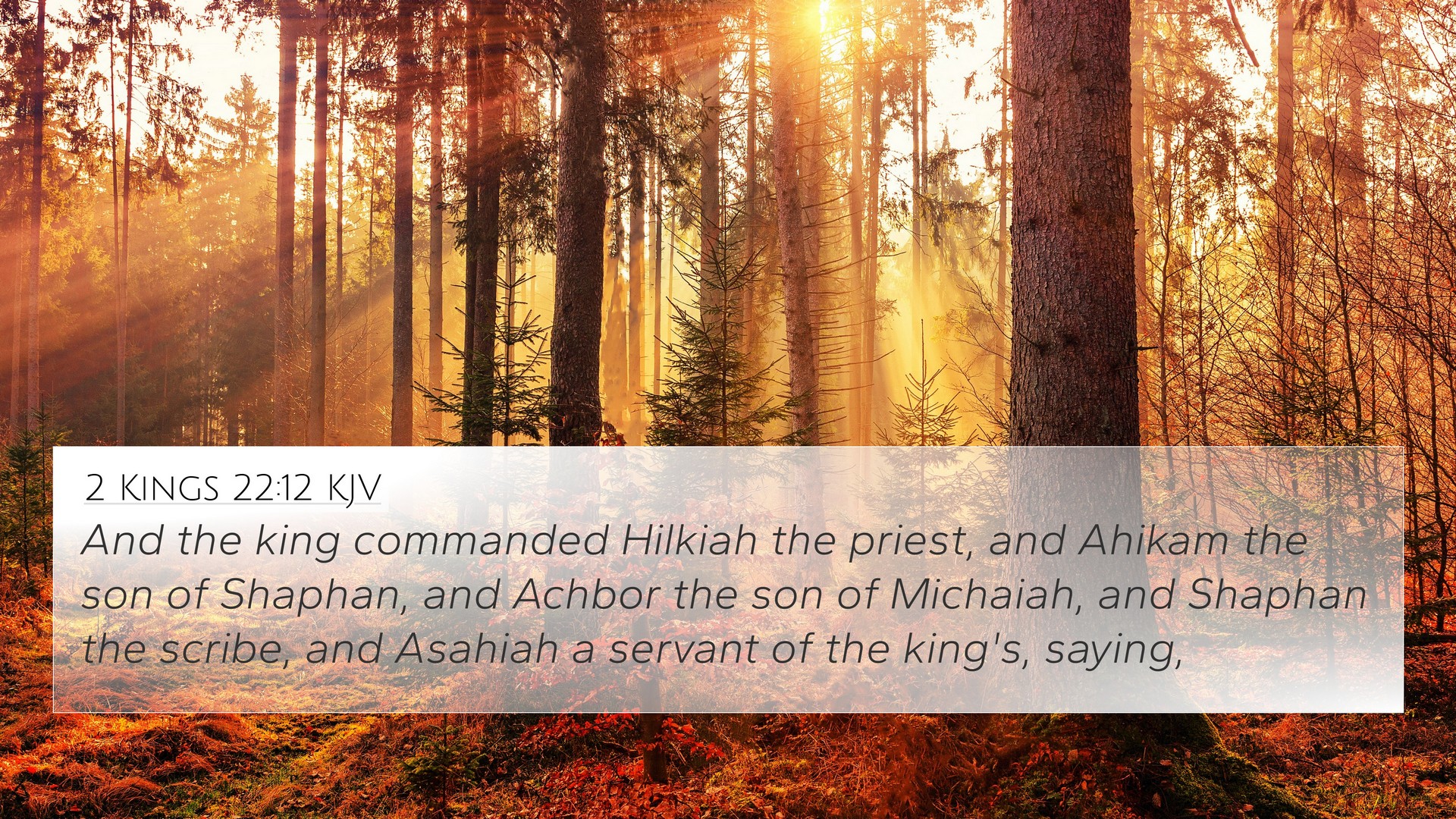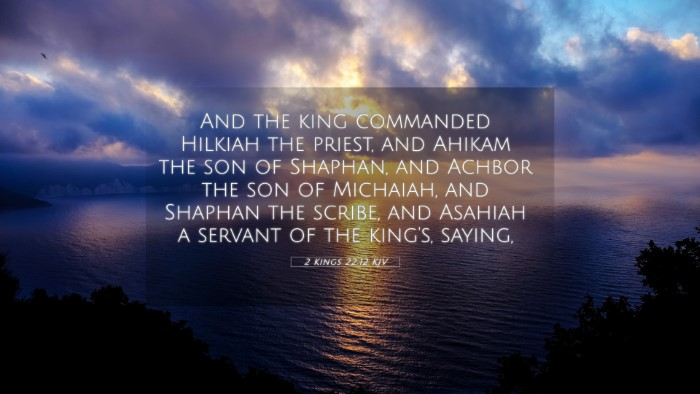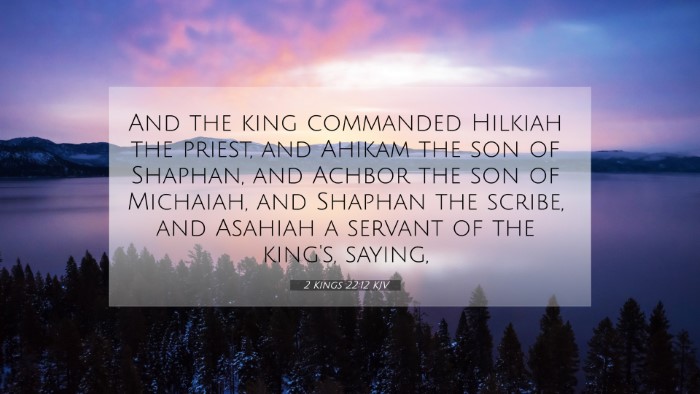Old Testament
Genesis Exodus Leviticus Numbers Deuteronomy Joshua Judges Ruth 1 Samuel 2 Samuel 1 Kings 2 Kings 1 Chronicles 2 Chronicles Ezra Nehemiah Esther Job Psalms Proverbs Ecclesiastes Song of Solomon Isaiah Jeremiah Lamentations Ezekiel Daniel Hosea Joel Amos Obadiah Jonah Micah Nahum Habakkuk Zephaniah Haggai Zechariah Malachi2 Kings 22:12 Similar Verses
2 Kings 22:12 Cross References
And the king commanded Hilkiah the priest, and Ahikam the son of Shaphan, and Achbor the son of Michaiah, and Shaphan the scribe, and Asahiah a servant of the king's, saying,
Uncover the Rich Themes and Topics of This Bible Verse
Listed below are the Bible themes associated with 2 Kings 22:12. We invite you to explore each theme to gain deeper insights into the Scriptures.
2 Kings 22:12 Cross Reference Verses
This section features a detailed cross-reference designed to enrich your understanding of the Scriptures. Below, you will find carefully selected verses that echo the themes and teachings related to 2 Kings 22:12 KJV. Click on any image to explore detailed analyses of related Bible verses and uncover deeper theological insights.

Jeremiah 26:24 (KJV) »
Nevertheless the hand of Ahikam the son of Shaphan was with Jeremiah, that they should not give him into the hand of the people to put him to death.
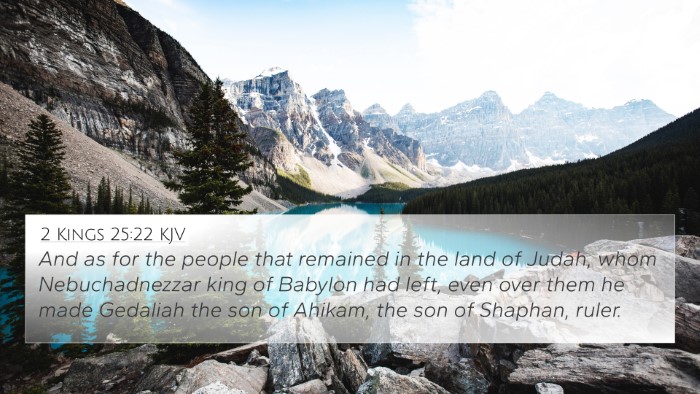
2 Kings 25:22 (KJV) »
And as for the people that remained in the land of Judah, whom Nebuchadnezzar king of Babylon had left, even over them he made Gedaliah the son of Ahikam, the son of Shaphan, ruler.
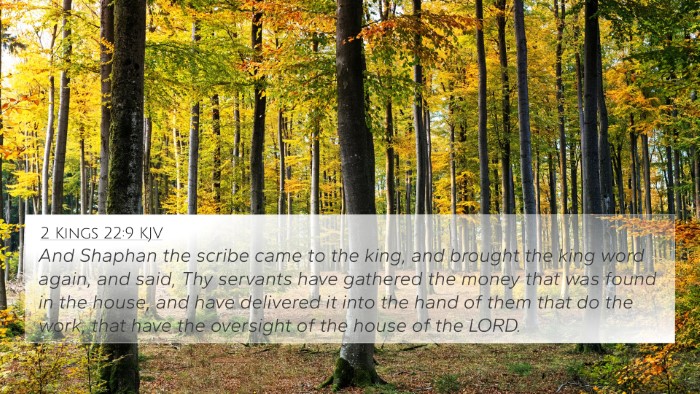
2 Kings 22:9 (KJV) »
And Shaphan the scribe came to the king, and brought the king word again, and said, Thy servants have gathered the money that was found in the house, and have delivered it into the hand of them that do the work, that have the oversight of the house of the LORD.
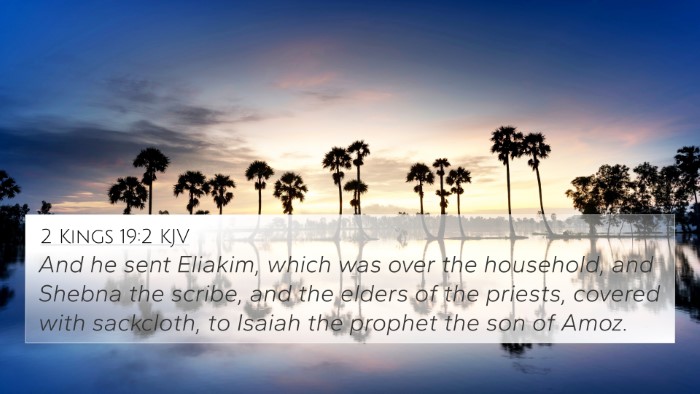
2 Kings 19:2 (KJV) »
And he sent Eliakim, which was over the household, and Shebna the scribe, and the elders of the priests, covered with sackcloth, to Isaiah the prophet the son of Amoz.
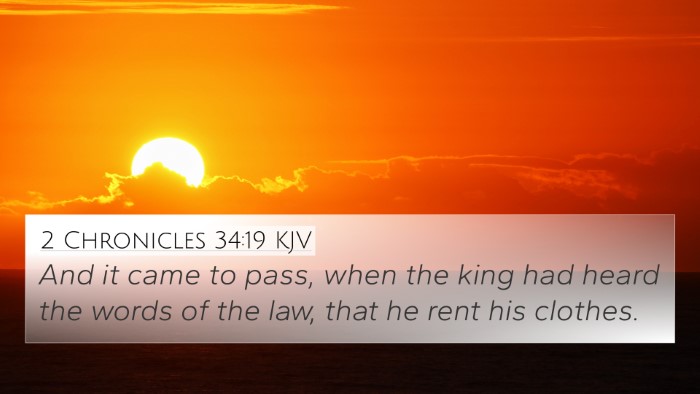
2 Chronicles 34:19 (KJV) »
And it came to pass, when the king had heard the words of the law, that he rent his clothes.

Isaiah 37:1 (KJV) »
And it came to pass, when king Hezekiah heard it, that he rent his clothes, and covered himself with sackcloth, and went into the house of the LORD.

Jeremiah 26:22 (KJV) »
And Jehoiakim the king sent men into Egypt, namely, Elnathan the son of Achbor, and certain men with him into Egypt.
2 Kings 22:12 Verse Analysis and Similar Verses
Understanding 2 Kings 22:12
The verse 2 Kings 22:12 states:
"And the king commanded Hilkiah the high priest, and the priests of the second order, and the keepers of the door, to bring forth out of the temple of the LORD all the vessels that were made for Baal, and for the grove, and for all the host of heaven; and he burned them without Jerusalem in the fields of Kidron, and carried the ashes of them unto Bethel."
Summary of Key Themes
This verse demonstrates King Josiah's commitment to purifying the worship of Yahweh in the temple by eliminating idolatrous vessels associated with Baal and other pagan practices. The tasks were immediate and carried out with a sense of urgency to restore proper worship in Judah.
Insights from Public Domain Commentaries
Combining insights from Matthew Henry, Albert Barnes, and Adam Clarke, we learn the following meanings and implications:
- Josiah's Reforms:
In response to the discovery of the Book of the Law, Josiah's reforms reflect not only a political cleansing but also a spiritual renewal. This act illustrates his resolve as a leader dedicated to the righteousness of God.
- The Role of Hilkiah:
Hilkiah, the high priest, played a pivotal role in carrying out the king's commands, showcasing the partnership between the monarchy and priesthood in pursuing holiness within Israel.
- Symbolism of Burning Idols:
The burning of these vessels signifies the complete rejection of idolatry, a crucial step in reinstating pure worship and commitment to the Lord.
- Historical Context:
This action must be viewed within the context of Israel's history, where syncretism had led to the worship of Baal and other idols. The destruction of such objects represented a turning point towards faithfulness.
- Connections to Prophetic Calls:
Josiah's actions align with the warnings of the prophets who condemned idol worship and called for repentance. This illustrates the ongoing dialogue throughout scripture about the need for purity in worship.
- Restoration of True Worship:
The act of removal serves as a precursor to restoring the covenant relationship with God, enforcing the idea that genuine worship requires a clean separation from sin and idolatry.
- Implication of Ashes:
Carrying the ashes to Bethel symbolizes the finality of the destruction of these pagan practices and reinforces the geographical significance of Bethel as a former site of worship, which now stands in contrast to true worship.
Bible Cross-References
To fully understand the significance of 2 Kings 22:12, consider the following cross-referenced verses:
- Deuteronomy 12:2-4: Instructions on the destruction of pagan altars.
- 2 Chronicles 34:3-7: A parallel account of Josiah's reforms.
- 1 Kings 18:21: The call to choose between God and Baal.
- Jeremiah 7:30-31: Prophetic condemnation of idol worship in the temple.
- Exodus 20:3-5: The command against idol worship.
- Isaiah 44:9-20: A critique of idolatry and its futility.
- Micaiah 1:7: The significance of true worship compared to false gods.
Connections Between Bible Verses
This verse demonstrates key thematic connections that provide deeper insights into biblical principles:
- Idolatry and Purity: The recurring theme in scripture showing God's anger towards idolatry.
- Authority of Scripture: The power of the Law in guiding and correcting Israel’s practices.
- Leadership and Accountability: The role of leaders in maintaining spiritual integrity within their communities.
Comparative Bible Verse Analysis
By using tools for cross-referencing and an understanding of how to find connections between Old and New Testament scripture, we can develop a more complete picture of God’s will:
- Identifying the importance of worship in the fulfillment of biblical teachings.
- Understanding how the prophetic voices consistently remind and redirect Israel towards authentic worship.
- Exploring the consequences of neglecting God's commandments, mentioned in both Testaments.
Thematic Bible Verse Connections
These connections also extend to various themes present in scripture:
- Repentance: Central to both Josiah's reforms and the prophetic call for Israel's return to God.
- Faithfulness: A reflection of God's enduring faithfulness to His covenant amidst human unfaithfulness.
- God's Sovereignty: Emphasizes God’s control over history and the importance of aligning with His will.
Conclusion
In conclusion, 2 Kings 22:12 serves as a powerful reminder of the necessity of cleansing and purifying worship amongst God’s people. Understanding scripture through comparative analysis and cross-referencing presents an enriched understanding of our faith and encourages us to pursue true worship in our lives today.
